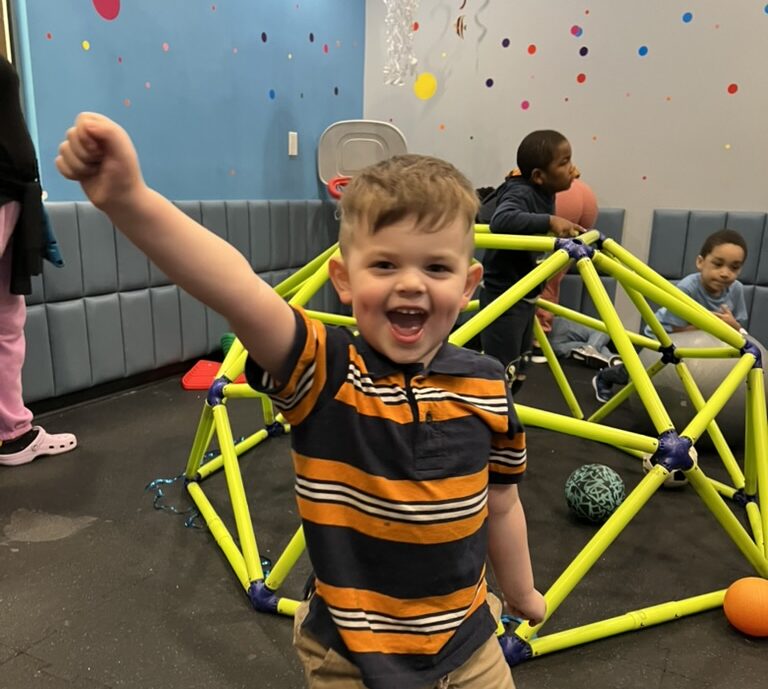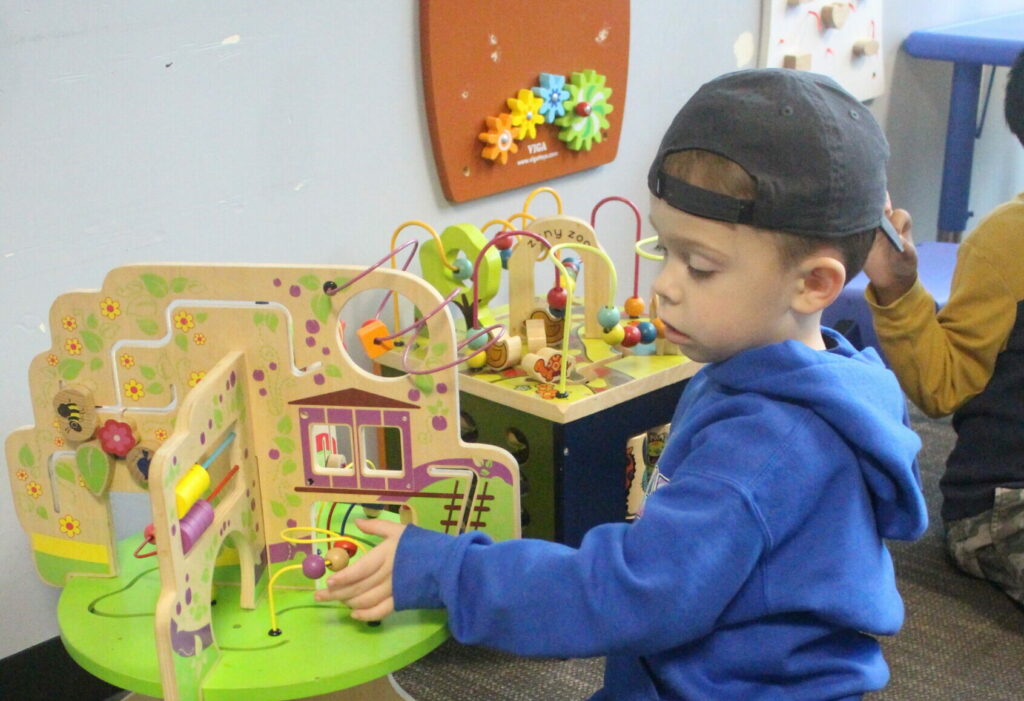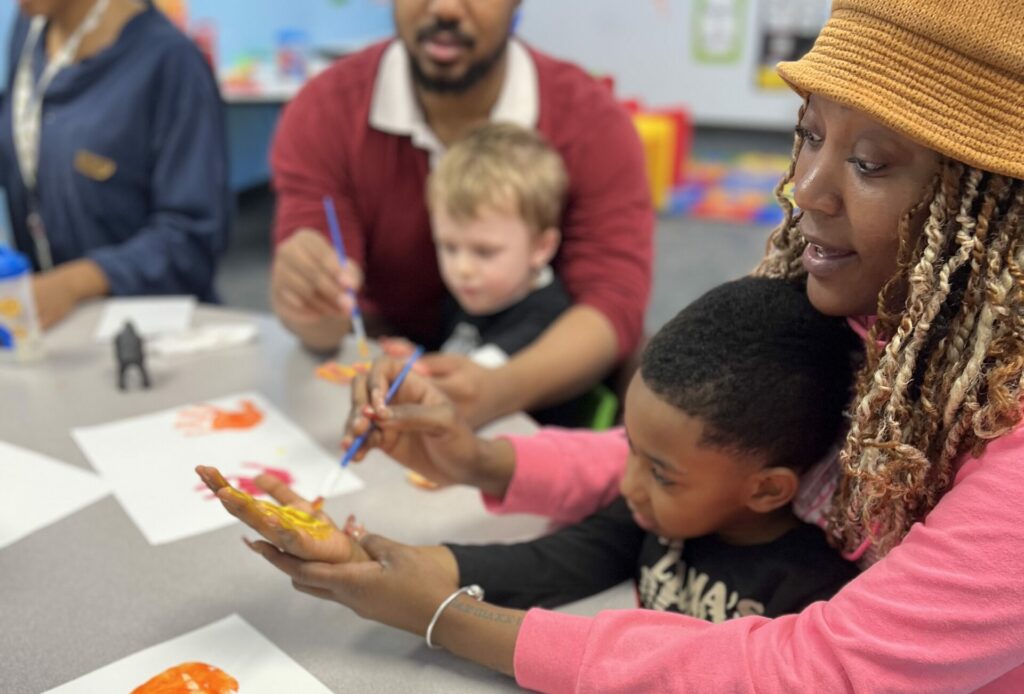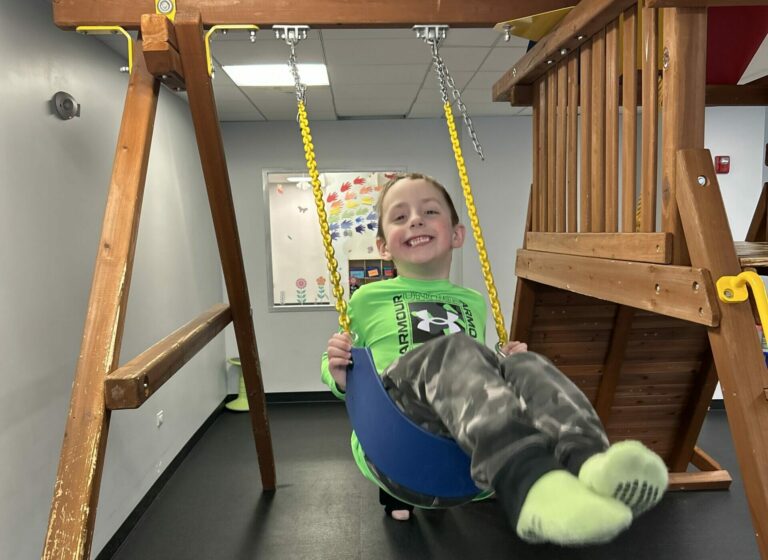Pediatric occupational therapy helps children gain independence so they can more effectively participate in the activities that occur throughout daily life. Pediatric Occupational Therapists are experts in identifying and addressing the skills children need to function and socialize more independently. Our Pediatric Occupational Therapists will evaluate a child’s current skills related to play, school performance, and daily activities. This information will be used to develop a therapeutic plan that is client-specific and tailored to meet the needs of each individual.

Occupational therapy is especially beneficial for children diagnosed with conditions such as autism spectrum disorder, ADHD, and sensory processing disorder. These children often experience challenges with regulation, motor skills, transitions, or attention. For an autistic child, occupational therapy can provide crucial tools for navigating everyday tasks, building routines, and managing sensory experiences that may otherwise feel overwhelming. These children often benefit from structured support in social skills, helping them engage more meaningfully in group activities or interactions.
Still, a formal diagnosis is not required to begin therapy. Children who show signs of difficulty with handwriting, focus, dressing, or mealtime behaviors may thrive through a pediatric OT evaluation. Pediatric occupational therapy is designed to be flexible and responsive, meeting each child where they are. Whether a child struggles with tying shoes or holding a pencil properly, the goal is always the same: to support functional, independent participation in daily life.
At By Your Side (BYS), we prioritize a needs-based approach – addressing real-life challenges with empathy and clinically sound strategies that are as unique as each child.
Every child experiences occasional difficulties, but some challenges can interfere with overall growth, confidence, and participation in family routines, school tasks, and social settings. Occupational therapy helps children work through functional challenges that impact their everyday lives. These may include delays in dressing, frequent difficulty using utensils, problems completing multi-step directions, or an inability to sit still and focus during class activities.

Some children may avoid touching certain textures, struggle with loud sounds, or become easily overwhelmed by busy environments – hallmarks of sensory processing disorder. Others might have trouble with body awareness or coordinating movements, leading to clumsiness, accidents, or hesitancy with new tasks.
These sensory issues often impact a child’s ability to regulate emotions, follow routines, or participate in group activities. Through sensory integration techniques, occupational therapists support children in responding more comfortably and effectively to their surroundings.
Emotional dysregulation, poor planning, and trouble with transitions can make school and home routines feel frustrating and overwhelming. Motor coordination therapy can help children improve their ability to control body movements, navigate obstacles, and engage more confidently in physical tasks.
BYS therapists are skilled in identifying the root causes behind these concerns and building a foundation of skills that lead to meaningful improvements in behavior, emotional regulation, and daily functioning. Our interventions support not only immediate needs but also long-term growth across environments where children live, learn, and play.
Below is a list of some of the skills targeted by occupational therapy at BYS (This list is not inclusive):
A pediatric OT evaluation at BYS is a comprehensive, collaborative process that looks beyond the surface to identify a child’s specific strengths, challenges, and developmental profile. The evaluation typically begins with a caregiver interview, where parents share detailed observations and concerns about their child’s habits, abilities, and struggles in everyday life.

Therapists then use a combination of standardized assessments and natural observations to evaluate key developmental areas. This often includes fine motor skill development (such as grasp patterns and hand dexterity), sensory processing abilities, gross motor planning, emotional regulation, and attention span.
For children with difficulties in areas like posture, coordination, or object manipulation, the evaluation provides a foundation for targeted gross motor skills therapy. In addition, therapists assess functional activities like dressing, feeding, and tool use as part of a broader focus on self-care skill building and independence.
We also explore more specialized concerns, such as handwriting difficulties in children, school task readiness, and social participation. Each evaluation concludes with a custom care plan that reflects the child’s needs, developmental stage, and family priorities.
Goals are created collaboratively and often align with real-world challenges – like preparing for kindergarten, improving classroom participation, or navigating sensory-rich environments more comfortably. Our process lays the groundwork for a meaningful and effective therapy experience.
Our occupational therapy sessions are rooted in play-based, child-centered techniques that make therapy both enjoyable and purposeful. We create engaging, sensory-friendly environments that encourage participation and celebrate small victories. Each therapy plan is personalized, reflecting both the evaluation findings and the child’s evolving goals and interests.
During sessions, children may work through activities designed to build motor coordination, such as obstacle courses, resistive play, or climbing tasks. For children with handwriting struggles, therapists incorporate games and tools that support fine motor control, grip strength, and bilateral coordination. Many activities involve structured play to support body awareness, timing, and sequencing – essential skills for school and everyday life.
Sensory integration therapy is a key part of our approach, particularly for children who are over- or under-responsive to sensory input. Using specialized tools like swings, weighted items, or textured surfaces, therapists help children gradually build comfort and confidence in managing sensory input. These strategies are essential for improving self-regulation, participation, and overall developmental growth.
Other children may work on therapy goals related to dressing, brushing teeth, or transitioning between tasks. These activities are integrated into sessions in creative, age-appropriate ways, allowing kids to build independence while having fun.
Whether a child is receiving support for autism spectrum needs, ADHD, or general developmental delays, our therapy techniques are tailored to maximize motivation and progress.
Parents play a vital part in the therapy journey at BYS. We believe meaningful progress happens when caregivers are informed, involved, and empowered. From the first evaluation to every session that follows, parents are active participants in setting goals, learning strategies, and tracking growth.

Therapists provide parents with regular updates, home-based activity ideas, and insights into the child’s therapy experience. This open communication helps reinforce therapy objectives outside of the clinic, allowing for more consistent skill development. Parents of children working through occupational therapy for autism or sensory challenges often find comfort and clarity in knowing what to look for and how to support new routines at home.
Our team values caregiver feedback and adjusts therapy goals based on what’s working well – or not – within a child’s daily life. Involving parents in therapy empowers families to advocate for their child’s needs in school and community settings. We view this collaboration not as supplemental, but essential to meaningful, sustainable progress.
Occupational therapy at BYS is rooted in measurable, observable progress – because seeing growth fuels motivation for both children and families. Therapists collect data during sessions, review parent input, and assess how well children are applying skills in everyday contexts.
Progress takes many forms: a child brushing their teeth independently for the first time, managing transitions with less frustration, or completing a puzzle using both hands in coordination. Milestones are personal and deeply meaningful – from mastering a fine motor task to initiating peer interaction or staying focused through an entire storybook.
Therapy goals are not static. As children grow and develop, therapists continually adjust the plan to reflect new challenges and emerging strengths. Our approach to tracking progress includes scheduled reassessments, open dialogue with caregivers, and routine check-ins to keep therapy aligned with real-world needs.
Each goal – be it attention, coordination, or emotional regulation – is met with thoughtful support, and every achievement along the way is celebrated.
Helping children transition successfully into school is a major focus of our occupational therapy. School readiness involves much more than knowing numbers or letters – it’s about being able to follow routines, start and finish tasks, and manage the demands of a structured environment.

Occupational therapy for school readiness may include building core strength for seated tasks, developing the ability to hold writing tools properly, or learning to cut and manipulate classroom materials. Children also experience therapy for attention issues, turn-taking, and the ability to follow multi-step directions. These skills help them feel confident in classroom settings and reduce frustrations that might otherwise interfere with learning.
We also help children with autism spectrum challenges build routines and tolerance for the sensory experiences that come with group settings. Our therapists collaborate with educators when needed, especially if a child has an IEP or is transitioning to a new classroom. With the right supports in place, kids can enter school feeling empowered and equipped to participate fully in their learning environment.
BYS is a trusted provider of pediatric occupational therapy because of our dedication to individualized care, evidence-based practices, and family collaboration. Our team of highly trained, credentialed therapists understands how to connect with children and build trusting relationships that lead to meaningful progress.
We work in sensory-friendly spaces designed to reduce overwhelm and spark engagement, making each visit to therapy something children look forward to. Whether your child is receiving early intervention for developmental concerns or ongoing support for a specific diagnosis, we offer a calm, supportive, and goal-oriented environment.
From detailed evaluations to targeted therapy plans and consistent progress tracking, we focus on the complete picture of a child’s growth. We also work closely with families and schools to help therapy carry over into daily life. If you’re looking for occupational therapy for autism, sensory support, or general child development therapy, you’ll find compassionate, knowledgeable care at BYS.
Occupational therapy for school readiness may include building core strength for seated tasks, developing the ability to hold writing tools properly, or learning to cut and manipulate classroom materials. Children also experience therapy for attention issues, turn-taking, and the ability to follow multi-step directions. These skills help them feel confident in classroom settings and reduce frustrations that might otherwise interfere with learning.
We also help children with autism spectrum challenges build routines and tolerance for the sensory experiences that come with group settings. Our therapists collaborate with educators when needed, especially if a child has an IEP or is transitioning to a new classroom. With the right supports in place, kids can enter school feeling empowered and equipped to participate fully in their learning environment.
BYS is a trusted provider of pediatric occupational therapy because of our dedication to individualized care, evidence-based practices, and family collaboration. Our team of highly trained, credentialed therapists understands how to connect with children and build trusting relationships that lead to meaningful progress.
We work in sensory-friendly spaces designed to reduce overwhelm and spark engagement, making each visit to therapy something children look forward to. Whether your child is receiving early intervention for developmental concerns or ongoing support for a specific diagnosis, we offer a calm, supportive, and goal-oriented environment.
From detailed evaluations to targeted therapy plans and consistent progress tracking, we focus on the complete picture of a child’s growth. We also work closely with families and schools to help therapy carry over into daily life. If you’re looking for occupational therapy for autism, sensory support, or general child development therapy, you’ll find compassionate, knowledgeable care at BYS.
Let our therapists start elevating the quality of your life. Meet with one of our representatives today!
We offer pediatric occupational therapy for children ranging from infancy through adolescence. Therapy goals are developmentally appropriate and tailored to the child’s stage – whether that means supporting early sensory exploration in toddlers or helping teens build executive functioning skills for daily independence.
Therapy timelines vary based on a child’s needs, goals, and progress. Some children reach targeted milestones in a few months, while others may benefit from ongoing therapy as part of a longer developmental journey. Each plan is reviewed regularly and adjusted to reflect growth and new challenges.
Most children attend OT sessions one to two times per week. Frequency is determined in collaboration with families and depends on clinical recommendations, goals being addressed, and scheduling needs. We balance intensity with consistency to support meaningful progress.
For private-pay clients, a referral is typically not required. However, if you’re using insurance, some providers may ask for one to authorize coverage. Our team is available to guide you through the process and help secure the necessary documentation.
Insurance coverage depends on your provider and plan. Many plans include occupational therapy benefits, though deductibles, visit limits, and prior authorization requirements may apply. We offer support in checking benefits, discussing financial options, and helping families plan ahead.
Absolutely. Feeding challenges are a common focus in occupational therapy, especially when linked to sensory processing or motor coordination. Our occupational therapist team works on oral motor skills, food tolerance, self-feeding routines, and reducing mealtime stress for both the child and family.
At BYS, we don’t just deliver therapy – we build relationships. Our approach blends sensory-informed treatment, functional skill-building, and strong parent involvement. Sessions are personalized, progress is closely tracked, and our team is committed to supporting carryover into the child’s home, school, and daily life routines.